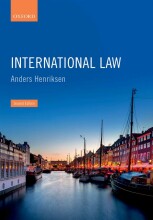The peaceful settlements of disputes - The International Court of Justice
5 important questions on The peaceful settlements of disputes - The International Court of Justice
Who has access (who may bring or be brought before the Court) to the ICJ in contentious (omstreden) cases?
Which ways are there for states to express their consent?
- Compromis; parties agree to submit a particular dispute to the Court,
- A treaty where the parties agree to submit future disputes between them to the ICJ,
- A declaration to accept the Court's jurisdiction now and in the future or
- A forum prorogatum; a state has not consented to the jurisdiction of the Court but it does when an application is filed against them
Which rule does the ICJ apply in the cases of third states?
- Higher grades + faster learning
- Never study anything twice
- 100% sure, 100% understanding
When can the Court indicate provisional measures to preserve the respective rights of either party?
What does the UN Charter say about the judgements by the Court that are final and without appeal?
The question on the page originate from the summary of the following study material:
- A unique study and practice tool
- Never study anything twice again
- Get the grades you hope for
- 100% sure, 100% understanding
































